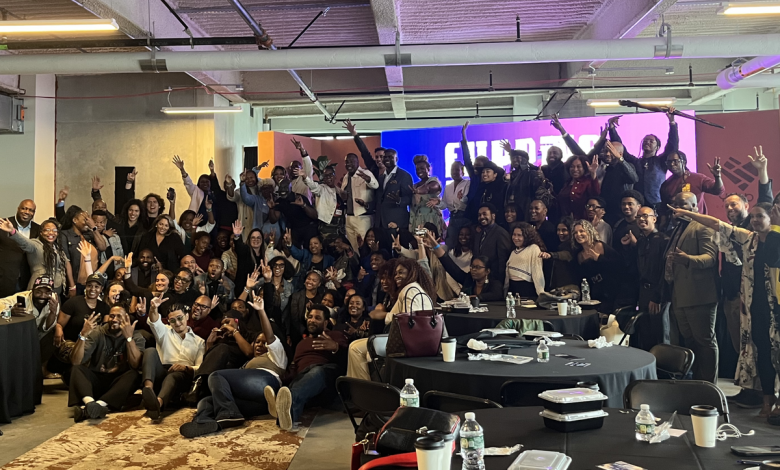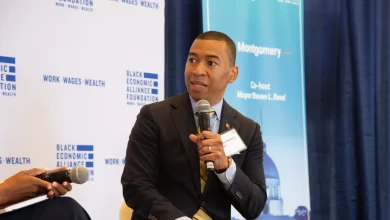Even As Business World Guts DEI, Black Developers Carve A Path Forward

As the Trump administration and some of the country’s wealthiest corporations seek to roll back initiatives that aimed to close the racial wealth gap, Black commercial real estate executives are undeterred.

Bisnow/Ciara Long
Attendees onstage at the end of Friday’s panels at Yoba Development’s Flipping The Hood event.
After a yearslong push to increase DEI in real estate following the post-George Floyd reckoning, President Donald Trump‘s election kicked off a wave of backlash against corporate diversity initiatives.
“It’s been a great few years where companies have really invested and had that mission,” said Nekesha Sawh, a senior portfolio programs manager at Hines. “But we’ve been through this before. For me, this feels like a recycling of time. We’ve been given information from our ancestors and our previous leaders on how we should operate.”
On the first day of his second term, Trump issued an executive order directing the federal government to identify “discriminatory” diversity, equity and inclusion policies that have been present in the business world over the last half-decade.
On Friday and Saturday, on the the top floor of a Brooklyn Navy Yard building, real estate executives, developers, contractors and students of color came together for Yoba Development’s Flipping The Hood event, designed to create pathways in commercial real estate for the next generation. They didn’t see Trump’s “war on woke” as anything more than the type of hurdle they have always dealt with.
“All Black people have been doing since we landed here is fighting to be free,” Yoba Development CEO Malik Yoba said after the Friday session while sipping rosé cuvée at Black woman-owned B. Stuyvesant Champagne’s Navy Yard tasting room.
“All I’m doing is the same thing all of my ancestors have ever done,” said Yoba, who launched his NYC-based development firm in 2017 after decades as an actor, with roles in Cool Runnings, NYPD Blue and Arrested Development. “They’re saying, ‘I deserve to be here, just like you.’”
This year’s Flipping The Hood was attended by more than 300 people, according to an event organizer. The topics discussed on the panel didn’t touch on the changes in the political environment but instead overcoming the obstacles that have held back communities of color in this country for more than a century.
Lack of access to capital for down payments is the main way that housing discrimination continues today, Brookings Metro Senior Fellow Andre Perry said onstage. But events like this one are fundamental to changing that, he said.
“What you do here in your communities can be scaled and resourced,” he said to the audience of professionals and college students. “If you have a project or a practice that you think can be scaled and codified, let me know, and we’ll try to make that happen.”
Executives at the event said that opportunities for people of color to advance their own communities exist in commercial real estate specifically because they, and the areas many of them grew up in, have been dismissed by traditional industry players.
“Our profit is better because we’re investing in places that people have overlooked,” said Tawan Davis, founding partner and CEO of Steinbridge Group, which targets residential and mixed-use properties in transitioning submarkets in growing metro areas. “The very idea of a good investment is that you put money where nobody else was looking.”

Bisnow/Ciara Long
Dena Yoba, Malik Yoba and Randy Lopez in B. Stuyvesant Champagne’s ‘Sipping Room’ at the Brooklyn Navy Yard after Flipping The Hood’s Friday panels wrapped.
Even still, cuts to housing programs and grant funding are having an impact on the community development space.
“I know a lot of nonprofits that are being slammed,” said Stacy Rhone, president and CEO of community development financial institution BiGAUSTIN. “We’re actually partnering with a number of them now to help them reverse the effects of the losses of funding.”
The CDFI, which aims to reverse the redlining that came out of Austin’s 1928 Master Plan through nonprofit lending to small businesses and for-profit investment in affordable housing and development, started reducing its reliance on federal dollars four years ago. Today, BiGAUSTIN uses zero federal dollars, Rhone said.
But that doesn’t mean BiGAUSTIN is seeing investors shy away from investing in communities of color despite Trump’s day one executive order and companies like Target and Walmart following suit.
“The large majority of financial institutions are not afraid. They’re still investing, and they’re still participating in what we’re doing,” Rhone said. “It’s not just an investment in people of color or in underserved communities. It’s an investment that truly gives a return.”
That sentiment was echoed throughout the event’s panels and in conversations with attendees.
“It happens to be that the neighborhoods in the country, the areas in the country, the opportunities in the country that are emerging are the ones that are adjacent to areas that have been overlooked in the past,” Davis said. “That’s where I think the most, the highest returns and the highest profit is going to be.”
Ten years ago, a gathering like Flipping The Hood would have looked more like a job fair with corporations looking explicitly to hire, Davis said. Instead, what exists in 2025 looks more akin to a networking event where people can learn from experts in adjacent fields and expand their networks.
“If we were treating all of these gatherings like just another job fair, there would be a challenge, because there’s all of these negative headwinds,” he said. “What is key is for us to make opportunities.”
The intentions behind Yoba Development’s event make a difference for young people thinking about careers, said Semaj Cormier, a sophomore studying business analytics and financial planning at Babson College who came to Flipping The Hood.
“To be told that you can be shown the methods, and to see the people that look like you already in those stages, not only is it motivational, but it’s also encouraging and factual to show people that they can,” she said. “I definitely feel hopeful.”




